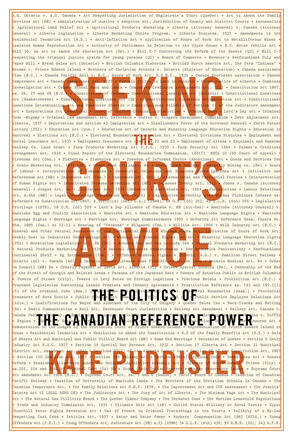
Seeking the Court’s Advice
The Politics of the Canadian Reference Power
The first comprehensive analysis of the Canadian reference power, Seeking the Court’s Advice examines how policy makers use the courts strategically to achieve political ends.
Description
Can Parliament legalize same-sex marriage? Can Quebec unilaterally secede from Canada? Can the federal government create a national firearms registry? Each of these questions is contentious and deeply political, and each was addressed by a court in a reference case, not by elected policy makers. Reference cases allow governments to obtain an advisory opinion from a court without a live dispute or opposing litigants – and governments often wield this power strategically. The first study of its kind, Seeking the Court’s Advice draws on over two hundred reference cases from 1875 to 2017 to show that the actual outcome of a reference case – win or lose – is often secondary to the political benefits that can be attained from relying on courts through the reference power.
Reviews
this is an excellent book that completely fills a major and unfortunate lacuna in the academic literature. It is well organized, well written, thorough and balanced, and it winds up with recommendations for better squaring the practice with judicial independence concerns.
A first book, you say, and by a very junior author? It certainly doesn’t read that way—this is a polished work of mature scholarship. I recommend it highly.
- Peter McCormick
…Seeking the Court’s Advice will likely affect the way the power is exercised and conceived of by governments, interveners, and courts.
- Jennah Khaled, JD, Osgoode Hall Law
[Puddister] manages to provide a superb and comprehensive analysis of the development, evolution, and purposes of the reference power.
- Emmett Macfarlane, associate professor, University of Waterloo